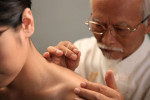

With the cost of Western medicine skyrocketing, many are looking to alternative medicine for more  affordable, and possibly, more effective treatments. With around $82 billion dollars being spent on prescription medication for the elderly, seniors could benefit greatly from exploring alternative medical treatments, such as acupuncture.
affordable, and possibly, more effective treatments. With around $82 billion dollars being spent on prescription medication for the elderly, seniors could benefit greatly from exploring alternative medical treatments, such as acupuncture.
Acupuncture is an ancient Chinese treatment that uses needles to stimulate specific acupressure points in the body. In this alternative healthcare system, pain and illness are viewed as a sign that your body is out of balance. Acupuncture treats each person based on his or her individual needs, rather than using the same treatment for every person showing the same signs of a particular illness. Just because two people share the same medical diagnosis, does not mean that they will share the same acupuncture treatment, as the cause of illness will vary from person to person. Physical, emotional and mental conditions all are taken into account, and the main goal of an acupuncture treatment is to balance the body, thus erasing the root cause of illness, rather than just treating a byproduct of it.
Although acupuncture is rising in popularity, many people still know little or nothing about it, especially since it’s just entered the mainstream world in the last twenty years.
In order to give you some insight on what acupuncture is, we’ve answered some general questions about it below:
What Does an Acupuncture Treatment Consist Of?
Most often, acupuncture involves several weekly or bi-weekly treatments, with most treatments involving about 12 sessions. You’ll be asked to lie down, either face-up or facedown, or on your side depending on where the treatment needs to be administered. Your acupuncturist will insert single-use, disposable needles into acupuncture points in your body. The needles then remain inserted for about 30 minutes.
How Does Acupuncture Work?
Chinese medicine believes that our body is connected through a channel of meridians or pathways. Along these meridians, there are 400 acupuncture points, which can be stimulated using acupuncture needles. This stimulation releases a flow of energy called qi (or chi) into your body’s meridians. In traditional Chinese medicine, chi is known as the life-force energy that sustains living beings. Good health is thought to be created by balancing the yin and yang of a person’s chi, so by inserting needles into the right combination of points, that balance can be achieved.
Does Acupuncture Hurt?
Every person will react differently to acupuncture. Most people will feel the needle go in, and many will feel different sorts of sensations. The most common descriptions of what acupuncture feels like are: heavy, achy, electric, tingly, and warm.
You should never feel intense pain, if you do, make sure to let your acupuncturist know so they can adjust the needle. Some people will experience bruising – this is not uncommon, so if it happens, don’t be alarmed.
How Can Acupuncture Help You?
Acupuncture has been proven to be an effective alternative treatment for everything from insomnia to obesity. Here are some ways that acupuncture can benefit you:
How Can Acupuncture Be Beneficial For Seniors Citizens Specifically?
Taking multiple combinations of medications or being over medicated can exhaust and confuse the body. Who does manage all of those medications? The doctor? The pharmacist? The physician assistant? Most likely is you, and it can get very complex for you as well as for your body. By using acupuncture to help balance the body, seniors can sometimes reduce the amount of medications they are taking. Acupuncture can help balance emotional well-being reducing stress from depression and anxiety that often hitch a ride in our culture during our aging process. Less stress of the body and the emotions can keep you from leading an active yet restful and balanced life in your second half of life. Acupuncture has great potential to balance out energy deficiencies, allowing you to live a more active life.
Learn more about acupuncture by visiting these websites below:
www.nccam.nih.gov – National Center for Complementary & Alternative Medicine
www.nccaom.org – National Certification Commission for Acupuncture and Oriental Medicine
Author: Kimberly Recor, staff writer at Designing Brighter Tomorrows
© 2014 Designing Brighter Tomorrows, Inc.
This site is for information only, and is for your voluntary use at your own risk. See Terms of Use